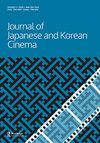Introduction
引用次数: 0
Abstract
This special issue of The Journal of Japanese and Korean Cinema both celebrates and continues the legacy of the Korean Screen Culture Conference. The Korean Screen Culture Conference held at King’s College London between June 2 and 4 in 2016 (Figure 1), was only the fifth-year event since the one-day workshop, ‘Korean Film: Years of Radical Change’, hosted at the School of Oriental and African Studies in 2012. As Andrew Jackson sketches in his introduction to the special issue (Volume 8, no. 1) of this journal, despite the short history of the conference it has indeed attracted a wide range of interest from media and Korean studies scholars and students not only in the UK and Europe but across the Atlantic and the Mediterranean. As will be discussed below, the topics and various threads that ran throughout the conference showcase the expansion of not only the object and scope of study, but also the methods employed. In 2016s conference, the number of panels reached twelve with over forty presenters, a great increase from the previous year of seven panels with twenty six presentations. We appreciate the continuing support from the Korea Foundation, without which the conference would not have been feasible. Those funds helped us to support speakers who otherwise would not have been able to attend, and this was especially important for the substantial number of research students who participated. Speakers came from as far afield as New Zealand and Ghana. The School of Arts and Humanities and the Department of Film Studies at King’s College London further granted generous support. The Korean Cultural Centre in London kindly collaborated with the conference organizers for this event, holding a very convivial reception that was a memorable social highlight to match the academic ones. The papers given at the 2016 Korean Screen Cultures Conference featured continuing strength in core areas of Screen Studies, such as analysis of classic films and auteurfocused projects. But they also demonstrated the diversification of objects of study and approaches that has been a characteristic of the KSCC all along. These two tendencies are reflected in the selection of articles for this special issue. The focus on classics and auteurs is evident in the inclusion of the essays by Hee-seung Irene Lee (University of Auckland), Andrew D. Jackson (Monash University), and Aaron Han Joon Magnan-Park (University of Hong Kong), which focus on Hong Sang-soo’s Right Now, Wrong Then, Lee Gwang-mo’s (Lee Kwangmo) Spring in My Hometown and Yu Hyun-Mok’s Obaltan respectively. The diversification of objects and approaches appears in the essays by Julia Keblinska (University of California, Berkeley) on the television drama Reply 1994 and by Antonetta介绍
《日韩电影杂志》的这期特刊既庆祝又延续了韩国银幕文化会议的传统。2016年6月2日至4日在伦敦国王学院举行的韩国电影文化大会(图1)是自2012年在东方与非洲研究学院举办的为期一天的研讨会“韩国电影:激进变革的岁月”以来的第五年活动。正如安德鲁·杰克逊在本杂志特刊(第8卷,第1期)的引言中所述,尽管会议历史很短,但它确实吸引了媒体和韩国研究学者和学生的广泛兴趣,不仅在英国和欧洲,而且在大西洋和地中海。正如下面将要讨论的那样,贯穿整个会议的主题和各种线索不仅展示了研究对象和范围的扩展,还展示了所采用的方法。在2016年的会议上,小组讨论会的数量达到了12个,有40多名演讲者,比前一年的7个小组讨论会和26个演讲者大幅增加。我们感谢韩国基金会的持续支持,如果没有这些支持,会议就不可能举行。这些资金帮助我们支持了那些本来无法出席的演讲者,这对参加的大量研究生来说尤其重要。演讲者来自遥远的新西兰和加纳。伦敦国王学院艺术与人文学院和电影研究系进一步给予了慷慨的支持。位于伦敦的韩国文化中心与此次活动的会议组织者进行了友好合作,举办了一场非常欢乐的招待会,这是一场令人难忘的社会亮点,与学术界的招待会相匹配。在2016年韩国电影文化大会上发表的论文展示了电影研究核心领域的持续优势,如经典电影分析和以导演为中心的项目。但他们也证明了研究对象和方法的多样性,这一直是KSCC的特点。这两种趋势反映在本期特刊的文章选择中。对经典和导演的关注体现在收录了奥克兰大学的Hee-seung-Irene Lee、莫纳什大学的Andrew D.Jackson和香港大学的Aaron Han Joon Magnan-Park的文章中,这些文章分别聚焦于洪的《现在是对的,然后是错的》、李光模的《我家乡的春天》和于贤莫的《Obaltan》。对象和方法的多样化出现在Julia Keblinska(加州大学伯克利分校)关于电视剧《回复1994》的文章和Antonetta的文章中
本文章由计算机程序翻译,如有差异,请以英文原文为准。
求助全文
约1分钟内获得全文
求助全文
来源期刊

Journal of Japanese and Korean Cinema
Arts and Humanities-Visual Arts and Performing Arts
CiteScore
0.60
自引率
0.00%
发文量
16
期刊介绍:
Journal of Japanese and Korean Cinema is a fully refereed forum for the dissemination of scholarly work devoted to the cinemas of Japan and Korea and the interactions and relations between them. The increasingly transnational status of Japanese and Korean cinema underlines the need to deepen our understanding of this ever more globalized film-making region. Journal of Japanese and Korean Cinema is a peer-reviewed journal. The peer review process is double blind. Detailed Instructions for Authors can be found here.
 求助内容:
求助内容: 应助结果提醒方式:
应助结果提醒方式:


